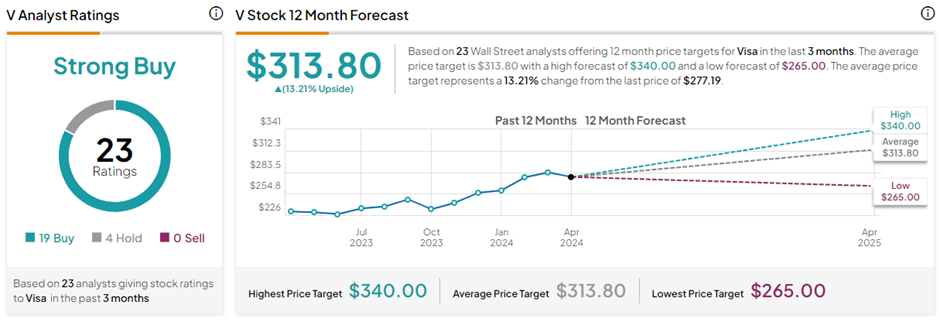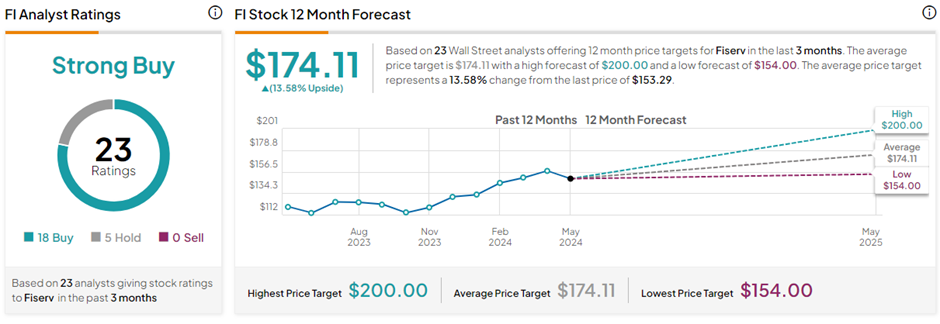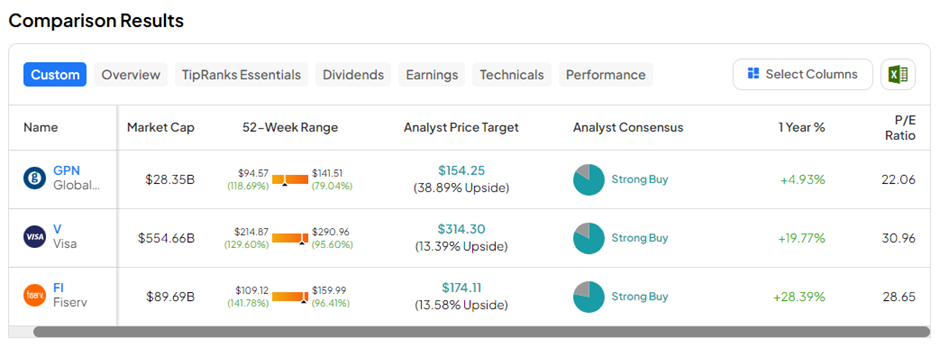Fintech
The 3 best Fintech stocks to buy in May 2024, according to analysts

Global Payments, Visa and Fiserv are the 3 best Fintech stocks to buy in May 2024, according to Wall Street analysts. We took advantage of the TipRanks Stock Screener Tool to discover fintech companies that analysts are bullish on. The financial technology or fintech sector encompasses a wide range of activities, including payment processing, digital banking, lending, financial software and financial services.
The fintech sector is set to witness greater momentum in 2024 with the expectation of interest rate cuts by the end of the year. More and more people are switching from traditional banking and lending services to technologically advanced financial solutions to meet their financial needs. Furthermore, with the advent of artificial intelligence (AI)-LED, the ease and efficiency of fintech platforms have improved dramatically. Additionally, consumers are becoming more familiar with digital currencies, providing greater possibilities for the growth of fintech platforms. With this context in mind, let’s take a deeper look at the three companies.
No. 1 Global Payments (NYSE:GPN)
Global Payments offers payment technology and software solutions to merchants, issuers and consumers. GPN’s services include card, electronic, check and digital payments in the United States and international markets. The company has more than 4 million payment customers in more than 100 countries, processing more than 66 billion transactions each year. GPN also pays regularly quarterly dividend of $0.25 per share, which reflects a yield of 0.9%. Furthermore, the company’s board of directors has authorized to $2 billion stock repurchase plan.
In Q1FY24, GPN Adjusted earnings per share (EPS) increased 8% year over year to $2.59 and also surpassed the analyst consensus of $2.57. Meanwhile, adjusted net revenue grew 7% year over year to $2.18 billion. Based on continued momentum, GPN expects 2024 adjusted net revenue growth of 6% to 7%. Additionally, adjusted EPS is expected to grow 11% to 12%.
Importantly, GPN trades at a forward P/E or price-to-earnings (non-GAAP) of 9.52x, lower than the industry average of 10.56x and also below its five-year average of 18.94x , indicating that the stock is currently undervalued and has further room to grow.
Is GPN a good stock to buy?
With 21 Buys and four Hold ratings, GPN stock has a Strong Buy consensus rating on TipRanks. THE Global Payments average price target of $154.25 implies an upside potential of 38.9% from current levels. Over the past year, GPN shares have gained 4.1%.
#2 Visa Inc. (NYSE:V)
The multinational payment card service provider Visa needs no introduction. The company does not issue credit cards or loans. Instead, it facilitates electronic fund transfers around the world, most commonly via Visa-branded credit cards, debit cards, and prepaid cards. Visa pays regularly cash dividend of $0.52 per sharewhich represents a yield of 0.7%.
In Q2FY24, Visa easily beat consensus estimates on both top and bottom lines. Compared to the prior-year quarter, payment volume grew 8%, cross-border volume increased 16%, and transactions processed increased 11%. In the three months ending March 31, Visa repurchased $2.7 billion worth of shares and has $23.6 billion remaining in its authorized repurchase program.
For Q3FY24, Visa expects low double-digit net revenue growth and EPS growth in the low double-digit range compared to the prior-year period. Visa trades at a forward P/E (non-GAAP) of 27.81x, above the industry average but below the five-year average of 31.72x, reflecting the potential for further growth.
Are Visa shares a buy or a sell?
V stock has a Strong Buy consensus rating on TipRanks based on 19 Buys versus four Hold ratings. THE Visa average price target of $313.80 implies an upside potential of 13.2% from current levels. V shares have gained 18.8% over the past year.
#3 Fiserv Inc. (NYSE:FI)
Fiserv is an American multinational corporation that provides account processing, digital banking, card issuer processing, network services, payments, e-commerce, and merchant acquiring and processing services. Fiserv has more than 6 million business locations worldwide and 10,000 financial institution customers. It processes more than 25,000 financial transactions per second at most.
In the first quarter of fiscal 2024, adjusted EPS increased 19% year-over-year to $1.88 and also beat consensus. Additionally, revenue grew 7% year-over-year to $4.88 billion, slightly beating estimates. Meanwhile, organic revenue increased 20% to $5.04 billion. The company is committed share buybacks worth $1.5 billion in the quarter.
For full-year fiscal 2024, Fiserv guided for organic revenue growth of 15% to 17%, while raising adjusted EPS guidance from $8.60 to $8.75.
Fiserv trades at a forward P/E (non-GAAP) of 17.60x, which is higher than the industry average but lower than its five-year average of 19.91x, signaling further growth potential.
What is the target price for Fiserv?
THE Fiserv average price target of $174.11 implies an upside potential of 13.6% from current levels. Additionally, FI stock has a Strong Buy consensus rating on TipRanks, supported by 18 Buys and five Hold ratings. Over the past year, FI shares have gained 28.4%.
Key points
The fintech sector could see massive growth as retail customer spending improves as macroeconomic pressures ease. Investors can consider the above mentioned three fintech stocks to diversify your portfolios and increase your returns.
Fintech
US Agencies Request Information on Bank-Fintech Dealings

Federal banking regulators have issued a statement reminding banks of the potential risks associated with third-party arrangements to provide bank deposit products and services.
The agencies support responsible innovation and banks that engage in these arrangements in a safe and fair manner and in compliance with applicable law. While these arrangements may offer benefits, supervisory experience has identified a number of safety and soundness, compliance, and consumer concerns with the management of these arrangements. The statement details potential risks and provides examples of effective risk management practices for these arrangements. Additionally, the statement reminds banks of existing legal requirements, guidance, and related resources and provides insights that the agencies have gained through their oversight. The statement does not establish new supervisory expectations.
Separately, the agencies requested additional information on a broad range of arrangements between banks and fintechs, including for deposit, payment, and lending products and services. The agencies are seeking input on the nature and implications of arrangements between banks and fintechs and effective risk management practices.
The agencies are considering whether to take additional steps to ensure that banks effectively manage the risks associated with these different types of arrangements.
SUBSCRIBE TO THE NEWSLETTER
And get exclusive articles on the stock markets
Fintech
What changes in financial regulation have impacted the development of financial technology?

Exploring the complex landscape of global financial regulation, we gather insights from leading fintech leaders, including CEOs and finance experts. From the game-changing impact of PSD2 to the significant role of GDPR in data security, explore the four key regulatory changes that have reshaped fintech development, answering the question: “What changes in financial regulation have impacted fintech development?”
- PSD2 revolutionizes access to financial technology
- GDPR Improves Fintech Data Privacy
- Regulatory Sandboxes Drive Fintech Innovation
- GDPR Impacts Fintech Data Security
PSD2 revolutionizes access to financial technology
When it comes to regulatory impact on fintech development, nothing comes close to PSD2. This EU regulation has created a new level playing field for market players of all sizes, from fintech startups to established banks. It has had a ripple effect on other markets around the world, inspiring similar regulatory frameworks and driving global innovation in fintech.
The Payment Services Directive (PSD2), the EU law in force since 2018, has revolutionized the fintech industry by requiring banks to provide third-party payment providers (TPPs) with access to payment services and customer account information via open APIs. This has democratized access to financial data, fostering the development of personalized financial instruments and seamless payment solutions. Advanced security measures such as Strong Customer Authentication (SCA) have increased consumer trust, pushing both fintech companies and traditional banks to innovate and collaborate more effectively, resulting in a dynamic and consumer-friendly financial ecosystem.
The impact of PSD2 has extended beyond the EU, inspiring similar regulations around the world. Countries such as the UK, Australia and Canada have launched their own open banking initiatives, spurred by the benefits seen in the EU. PSD2 has highlighted the benefits of open banking, also prompting US financial institutions and fintech companies to explore similar initiatives voluntarily.
This has led to a global wave of fintech innovation, with financial institutions and fintech companies offering more integrated, personalized and secure services. The EU’s leadership in open banking through PSD2 has set a global standard, promoting regulatory harmonization and fostering an interconnected and innovative global financial ecosystem.
Looking ahead, the EU’s PSD3 proposals and Financial Data Access (FIDA) regulations promise to further advance open banking. PSD3 aims to refine and build on PSD2, with a focus on improving transaction security, fraud prevention, and integration between banks and TPPs. FIDA will expand data sharing beyond payment accounts to include areas such as insurance and investments, paving the way for more comprehensive financial products and services.
These developments are set to further enhance connectivity, efficiency and innovation in financial services, cementing open banking as a key component of the global financial infrastructure.
General Manager, Technology and Product Consultant Fintech, Insurtech, Miquido
GDPR Improves Fintech Data Privacy
Privacy and data protection have been taken to another level by the General Data Protection Regulation (GDPR), forcing fintech companies to tighten their data management. In compliance with the GDPR, organizations must ensure that personal data is processed fairly, transparently, and securely.
This has led to increased innovation in fintech towards technologies such as encryption and anonymization for data protection. GDPR was described as a top priority in the data protection strategies of 92% of US-based companies surveyed by PwC.
Financial Expert, Sterlinx Global
Regulatory Sandboxes Drive Fintech Innovation
Since the UK’s Financial Conduct Authority (FCA) pioneered sandbox regulatory frameworks in 2016 to enable fintech startups to explore new products and services, similar frameworks have been introduced in other countries.
This has reduced the “crippling effect on innovation” caused by a “one size fits all” regulatory approach, which would also require machines to be built to complete regulatory compliance before any testing. Successful applications within sandboxes give regulators the confidence to move forward and address gaps in laws, regulations, or supervisory approaches. This has led to widespread adoption of new technologies and business models and helped channel private sector dynamism, while keeping consumers protected and imposing appropriate regulatory requirements.
Co-founder, UK Linkology
GDPR Impacts Fintech Data Security
A big change in financial regulations that has had a real impact on fintech is the 2018 EU General Data Protection Regulation (GDPR). I have seen how GDPR has pushed us to focus more on user privacy and data security.
GDPR means we have to handle personal data much more carefully. At Leverage, we have had to step up our game to meet these new rules. We have improved our data encryption and started doing regular security audits. It was a little tricky at first, but it has made our systems much more secure.
For example, we’ve added features that give users more control over their data, like simple consent tools and clear privacy notices. These changes have helped us comply with GDPR and made our customers feel more confident in how we handle their information.
I believe that GDPR has made fintech companies, including us at Leverage, more transparent and secure. It has helped build trust with our users, showing them that we take data protection seriously.
CEO & Co-Founder, Leverage Planning
Related Articles
Fintech
M2P Fintech About to Raise $80M

Application Programming Interface (API) Infrastructure Platform M2P Financial Technology has reached the final round to raise $80 million, at a valuation of $900 million.
Specifically, M2P Fintech, formerly known as Yap, is closing a new funding round involving new and existing investors, according to entrackr.com. The India-based company, which last raised funding two and a half years ago, previously secured $56 million in a round led by Insight Partners, earning a post-money valuation of $650 million.
A source indicated that M2P Fintech is ready to raise $80 million in this new funding round, led by a new investor. Existing backers, including Insight Partners, are also expected to participate. The new funding is expected to go toward enhancing the company’s technology infrastructure and driving growth in domestic and international markets.
What does M2P Fintech do?
M2P Fintech’s API platform enables businesses to provide branded financial services through partnerships with fintech companies while maintaining regulatory compliance. In addition to its operations in India, the company is active in Nepal, UAE, Australia, New Zealand, Philippines, Bahrain, Egypt, and many other countries.
Another source revealed that M2P Fintech’s valuation in this funding round is expected to be between USD 880 million and USD 900 million (post-money). The company has reportedly received a term sheet and the deal is expected to be publicly announced soon. The Tiger Global-backed company has acquired six companies to date, including Goals101, Syntizen, and BSG ITSOFT, to enhance its service offerings.
According to TheKredible, Beenext is the company’s largest shareholder with over 13% ownership, while the co-founders collectively own 34% of the company. Although M2P Fintech has yet to release its FY24 financials, it has reported a significant increase in operating revenue. However, this growth has also been accompanied by a substantial increase in losses.
Fintech
Scottish financial technology firm Aveni secures £11m to expand AI offering

By Gloria Methri
Today
- To come
- Aveni Assistance
- Aveni Detection
Artificial intelligence Financial Technology Aveni has announced one of the largest Series A investments in a Scottish company this year, amounting to £11 million. The investment is led by Puma Private Equity with participation from Par Equity, Lloyds Banking Group and Nationwide.
Aveni combines AI expertise with extensive financial services experience to create large language models (LLMs) and AI products designed specifically for the financial services industry. It is trusted by some of the UK’s leading financial services firms. It has seen significant business growth over the past two years through its conformity and productivity solutions, Aveni Detect and Aveni Assist.
This investment will enable Aveni to build on the success of its existing products, further consolidate its presence in the sector and introduce advanced technologies through FinLLM, a large-scale language model specifically for financial services.
FinLLM is being developed in partnership with new investors Lloyds Banking Group and Nationwide. It is a large, industry-aligned language model that aims to set the standard for transparent, responsible and ethical adoption of generative AI in UK financial services.
Following the investment, the team developing the FinLLM will be based at the Edinburgh Futures Institute, in a state-of-the-art facility.
Joseph Twigg, CEO of Aveniexplained, “The financial services industry doesn’t need AI models that can quote Shakespeare; it needs AI models that deliver transparency, trust, and most importantly, fairness. The way to achieve this is to develop small, highly tuned language models, trained on financial services data, and reviewed by financial services experts for specific financial services use cases. Generative AI is the most significant technological evolution of our generation, and we are in the early stages of adoption. This represents a significant opportunity for Aveni and our partners. The goal with FinLLM is to set a new standard for the controlled, responsible, and ethical adoption of generative AI, outperforming all other generic models in our select financial services use cases.”
Previous Article
Network International and Biz2X Sign Partnership for SME Financing
IBSi Daily News Analysis

SMBs Leverage Cloud to Gain Competitive Advantage, Study Shows
IBSi FinTech Magazine

- The Most Trusted FinTech Magazine Since 1991
- Digital monthly issue
- Over 60 pages of research, analysis, interviews, opinions and rankings
- Global coverage
subscribe now
-

 DeFi11 months ago
DeFi11 months agoDeFi Technologies Appoints Andrew Forson to Board of Directors
-

 Fintech11 months ago
Fintech11 months agoUS Agencies Request Information on Bank-Fintech Dealings
-

 News12 months ago
News12 months agoBlock Investors Need More to Assess Crypto Unit’s Earnings Potential, Analysts Say — TradingView News
-

 DeFi11 months ago
DeFi11 months agoSwitchboard Revolutionizes DeFi with New Oracle Aggregator
-

 DeFi11 months ago
DeFi11 months agoIs Zypto Wallet a Reliable Choice for DeFi Users?
-

 News12 months ago
News12 months agoBitcoin and Technology Correlation Collapses Due to Excess Supply
-

 Fintech11 months ago
Fintech11 months agoWhat changes in financial regulation have impacted the development of financial technology?
-

 Fintech11 months ago
Fintech11 months agoScottish financial technology firm Aveni secures £11m to expand AI offering
-

 Fintech11 months ago
Fintech11 months agoScottish financial technology firm Aveni raises £11m to develop custom AI model for financial services
-

 News1 year ago
News1 year agoValueZone launches new tools to maximize earnings during the ongoing crypto summer
-

 Videos5 months ago
Videos5 months ago“Artificial intelligence is bringing us to a future that we may not survive” – Sco to Whitney Webb’s Waorting!
-

 DeFi1 year ago
DeFi1 year agoTON Network Surpasses $200M TVL, Boosted by Open League and DeFi Growth ⋆ ZyCrypto









